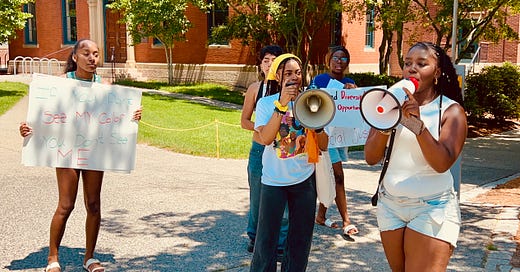Students of color speak out on what the end of affirmative action means for their future
“Affirmative action is not an easy way for Black students to get into an Ivy League prestigious college. It's a way for us to have an equal opportunity and for colleges to put us in mind..."
“It's my year to apply for college, and I think I've looked forward to this until I knew what college was,” said Met School student Zainabou Thiam to the 30 or so people gathered in the Brown University Quad. “So hearing that affirmative action would not be in the decision-making process when it came to my college application, really broke my heart because I know, although I have so many accolades and achievements and I'm very confident in myself academically, I don't have private tutoring. I don't go to a private school. I come from an inner city, Woonsocket, Rhode Island, where there's not a lot of education accessibility for a lot of the students.”
When the United States Supreme Court effectively ended race-based admissions at colleges and universities across the country, they subverted “the constitutional guarantee of equal protection by further entrenching racial inequality in education, the very foundation of our democratic government and pluralistic society,” said Justice Sonia Sotomayor in her dissent.
The high-achieving stidents of color who organized the Affrimative Action Call to Action on Saturday feel the loss persoanlly.
Zainabou Thiam
“…compared to students who may be going to LaSalle or who go to Bishop Hendrickin, I don't have everything accessible to me, and that really scares me for my future,” continued Thiam. “When I was 11 years old, I wrote an essay to my parents explaining to them that they wouldn't have to worry about me going to college because I would be the first female in my dad's family to ever graduate high school or go to a four-year institute.
“Affirmative action being ruled out has not only crippled my application but the applications of all first-generation immigrants who dream to be the first woman - or first person period - in their family to be able to attend a four-year institute. Without a four-year institution, it could cripple my chances for a successful future. That not only hurts me, it hurts my family here and it hurts my family back in Africa.
“So for whoever is watching this my ask is that you promote diversity, equity, and inclusion for all applicants so we have a safe space at these institutes, so we have the ability and opportunity to be just as successful as everyone else in America - because much like my parents and the rest of the world, we came here for equal opportunity and a chance to pursue our happiness. But without equitable education, we can't do that.”
Mariam Durowoju
“I'm here to protest against the overturn of affirmative action because I feel like there are so many misconceptions about affirmative action that are spewed in the media, especially when it comes to Black, indigenous, and Latino communities,” said Mariam Durowoju, a student at Pawtucket’s Tollman High School. “Affirmative action was set to reverse predominantly white institutions that are still in America today, especially since for the generations that we lived in this country, cis heterosexual white men have been prioritized when it comes to college admissions.
“A lot of people think affirmative action is just giving an easy gift or easy way in for Black or Latino students, but in reality, it's way different than people try to make it seem. Affirmative action has helped people of color have equal access to education in college, especially because there are so many who are in poverty and who are not able to get equal opportunities and don't go to private institutions.
“I feel like affirmative action has always been used to put down the accomplishments of Black students who are hard-working and put their all into their work, especially in school extracurricular activities and doing what they need to do to make sure that their community is a better and safe place for everyone involved. The overturn of affirmative action affects so many, not just me as a Black woman, but so many immigrants because America has not always prioritized immigrants and affirmative action is a way that we can be seen and heard and not overlooked.
“Affirmative action is not an easy way for Black students to get into an Ivy League prestigious college. It's a way for us to have an equal opportunity and for colleges to put us in mind rather than cis heterosexual white people. A lot of people, when they go on about the topic of affirmative action, don't keep in mind legacies, which have benefited white, rich people for years. Affirmative action is the only thing that's targeted because it's a way to help minorities in a country that has not prioritized us for generations. I'm here speaking, for the first time, for affirmative action to still be considered in college admissions. It's such an important thing for everyone of color, not just us, to have equal education and access when it comes to their future.
“I am not the first person in my family to graduate or enter college, but I am one of the first people in my family to come out and advocate so minorities like myself can have a better future.”
Mocorah Lewis
“I created a letter for future HBCU students about how affirmative action will benefit, will probably benefit, or not benefit the challenges of HBCUs,” said Mocrorah Lewis, a recent Met School graduate.
“Dear future HBCU students,
“Congratulations on your momentous decision to pursue higher education at an HBCU or Historically Black College or University. This choice demonstrates your unwavering commitment to seeking an education that not only uplifts your academic potential but also celebrates the rich history, culture, and accomplishments of Black Americans. HBCUs have always stood as pillars of strength and resilience, playing an indispensable role in American higher education.
“Established in the aftermath of the Civil War, these institutions provided a sanctuary where Black Americans could pursue their dreams of a college education in a nation deeply [entrenched] in racial segregation. While the Civil Rights Act of 1964 outlawed segregation, HBCUs continue to serve as a beacon of inclusivity, offering a warm and nurturing environment where Black college students, particularly those from low-income, first-generation backgrounds, can thrive.
“Though the recent decision to end affirmative action brings new challenges, we must view them as opportunities to rise even higher. We acknowledge the struggles for representation in Predominantly White Institutes also called PWIs, where the lack of teachers and professors who mirror the diversity of students hinders our full potential. We shall overcome this obstacle and use our experiences as the upcoming leaders in the world of change. Our presence, voices, and accomplishments will pave the way for a future where our stories are fully seen and celebrated.
“While it may be possible that in the face of limited diversity courses and clubs within PWIs, we will embrace our HBCU education wholeheartedly. Our institutions are fertile grounds for cultivating a deep understanding of our history, heritage, and contributions. We together can create our own platforms, amplifying our voices, and sharing our stories to bridge the gaps of misunderstanding and cultivate empathy and unity.
“As we embark on this transformative journey, let us confront the misconceptions head-on. Affirmative action exists to create equitable opportunities, ensuring that all students, regardless of their background, have a fair chance at higher education. We must reject attempts to pit communities against each other. Instead, we have to stand united, acknowledging that all collective success elevates us all. We must challenge stereotypes, dismantle barriers, and rewrite the narratives that have marginalized all of us. Our achievements will be a testament to the limitless potential within each of us and all minority students.
“Whether you are attending an HBCU or MSI [Minority-Serving Institution] remember you are embarking on an extraordinary journey. Know that you are part of a proud legacy that spans generations. Your presence will embody the spirit of those who came before you, - visionaries, activists, leaders - their sacrifices and triumphs have paved the way for our success today and shares the unique experiences, tradition, and cultural celebrations that you encounter. Embrace the responsibility and privilege of carrying the torch of progress and leading our communities towards a brighter future.
“Affirmative action has been the key to unlocking these hidden treasures, allowing countless individuals to overcome systemic barriers and contribute to society in remarkable ways. As the Supreme Court's decision jeopardizes this opportunity, we must act swiftly and decisively. We cannot let the door to education be shut on future generations. We must advocate for the preservation of affirmative action, ensuring that the untapped potential of our communities continues to flourish.”
Aaliyah Fortes
“When I was brought the news about affirmative action being overturned, I was having a hard time sorting through my feelings and my worries,” said Aaliyah Fortes, a rising Junior at the the Met School. “One way that I cope with and sort through those feelings is through creative writing. So I wrote a piece that I'm going to read to you.
“I've been fed a false fantasy.
“Liberty and justice for all. The very words embedded within our Pledge of Allegiance. Allegiance, devotion, or loyalty to a person, group, or cause. But how can this be possible when you forever treasured a particular-looking person or a particular-looking group or a particular sounding cause?
“For all. The full amount, quantity, or extent of. These endless callouts, just so my voice can be heard, leads me to concede the fact that I was never considered someone to begin with.
“But wait, they've started something called affirmative action that will not only protect me from discrimination but offer me the resources that will guide me in reaching my many, many goals. I finally feel seen.
“But wait, because we have turned back time. Whatever happened to history? We learn from it so it doesn't repeat itself, correct? So why take it away when it was proved to be resourceful? So many beacons of success. What about me and everyone else who now has to suffer the repercussions? Just as I thought we were getting somewhere, back to square one.
“I've been fed a false fantasy.”
Isis Grafals
“Along with Aaliyah I was also - not confused - I was very certain of my feelings - but I wasn't really sure how to talk about it because I never thought we'd have to talk about it,” said Isis Grafals, a rising senior at the Met School, “I was talking to someone about it and I want to share both perspectives and how I felt about the discussion.
“What truly is diversity? I was conversing with someone that is for removing affirmative action. We sat and discussed statistics, our agreements, disagreements, and whatnot. One of my biggest takeaways from this conversation was the topic of diversity and its significance.
“They said, ‘You have a university where all the people think the same but look different.’ To me, that's not true diversity. I agree with this statement: We don't necessarily have a true definition of what diversity is and to this person, it shouldn't be a result of the color of your skin or your race. True diversity is the mindset of a student, their way of thinking, creating, and changing the world. However, I found using this as a counter to affirmative action intellectually lazy. You have to think of how a student becomes an independent thinker and has their own stories to tell.
“I can tell you right now, true diversity is definitely not the same group of white students that grow up in the same environment, grow up in the middle class above, and with the same SAT tutors. I know that true diversity comes from your environment, cultural traditions, and ways of living, which provide these unique stories and mindsets.
“Your way of thinking is a result of who you are and who you are is based on your nature and cultural background. People believe that affirmative action [makes] people of color viewed as less than [others] because we are a resource of needed diversity in whatever place it may be. Affirmative action does not cure or curate that thought because unfortunately, in this country, that is an automatic label society has put upon the BIPOC community - an overall bias.
“It surprises me that affirmative action was shot down earlier than predicted. I think with proper timing, affirmative action can be removed, once we have reached the threshold of proper justice for the BIPOC community. We are obviously not there yet. If race was not an issue and we had proper justice and the system that planted racism did not exist, this would be a class issue. But that's not the case here.
“When you put poor people in poor communities, failing school systems, minimal career opportunities, and unfair pay wages, it pisses me off that those [who do this are] privileged enough to sit and act as if they play no role in this conclusion. Who proposed these actions? Who complained about it? Who displayed it, who instigated us, and who has put us minorities in displacement?
“It wasn't ever about giving us an advantage. It was about cleansing yourselves of your past sins. Once we reach the threshold, and you start practicing equality on our behalf, then we can talk again. We need people of color in order to provide diversity on a philosophical and intellectual level in these universities, and I know I can give my perspective to you white Americans and you can learn something from it.”
Also speaking were college students Paul, Augustin, and Migdalia. The event was emceed by Harrison Tuttle from the Black Lives Matter Rhode Island PAC. Also speaking at the event were Gerard Catala, President of the NAACP Providence Branch and Supreme Richardson, Assistant Executive Director of Black Lives Matter Rhode Island.









